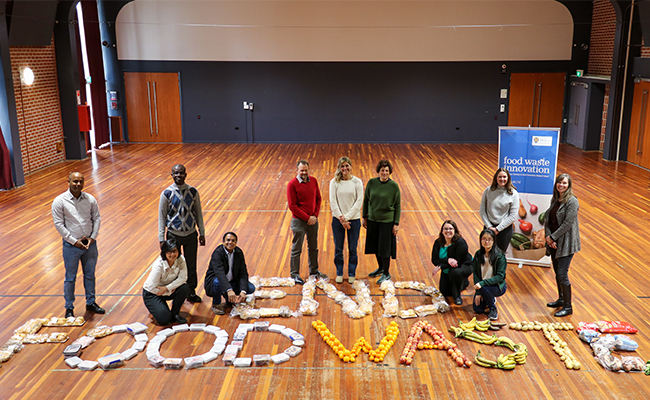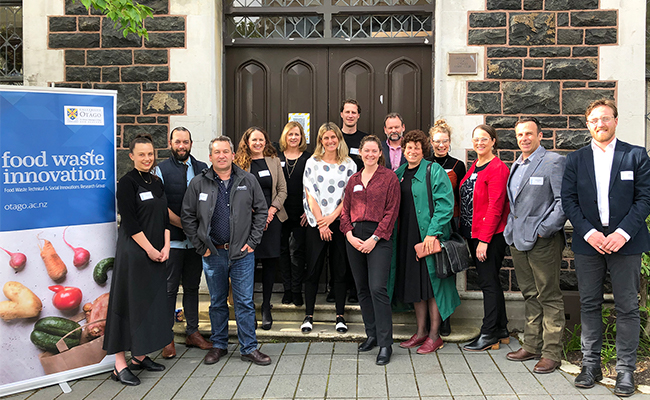Friday 16 October 2020 9:11am

The Food Waste Innovation Research Theme members took part in the first International Day of Awareness for Food Loss and Waste (29 September) by creating a display of the most wasted food items in New Zealand households.
Food waste has been identified as a major global issue with current waste estimates as high as one third of all food produced globally.
This week Otago’s new Food Waste Innovation Research Theme formally launched, which seeks to identify the extent of food waste in New Zealand-Aotearoa and provide evidence-based science to inform solutions addressing this challenge.
The research group is led by Department of Food Science Associate Professor Miranda Mirosa, who says that New Zealand lags behind food waste international standards set by other countries including the United States, United Kingdom and Australia.
“New Zealand does not currently have a national food waste reduction target, but setting such targets can create widespread change, across government, businesses and the community,” Associate Professor Mirosa says.
“Food waste has significant environmental, economic, and social implications, so this collaborative approach is required to start tackling food waste and ensuring that we have sustainable and secure food systems into the future.”
“As a country we are in a great position to take a lead in this area due to our reliance on primary production and food exports, and change needs to happen now to tackle this very big, but winnable, challenge.”
The Food Waste Innovation Research Theme gathers expertise from almost 30 researchers across the Sciences, Humanities and Business Divisions of the University to help provide effective solutions to the interdisciplinary challenge.
“Food waste has significant environmental, economic, and social implications, so this collaborative approach is required to start tackling food waste and ensuring that we have sustainable and secure food systems into the future.”

The Food Waste Innovation Research Theme steering committee pictured with the New Zealand Food Waste Champions 12.3 at the Theme’s launch. From left to right: Tessa Vincent (founder of the Champions group), Te Kawa Robb, Matt Dagger, Anna Yallop, Deborah Manning, Associate Professor Miranda Mirosa, Nick Loosely, Trixie Croad, Professor Phil Bremer, Professor Sheila Skeaff, Francesca Goodman-Smith, Susan Goodfellow, Andrew Fisher and Bobby Lloyd.
Associate Professor Mirosa has already made significant contributions to food waste, including a role as Specialist Advisor to the Members of Parliament’s Environment Committee where she compiled a report on the issues and actions for food waste in New Zealand.
The report, which has since been named the ‘Mirosa report’, discussed the knowledge gaps and priority actions that can be taken for research and innovation to reduce food waste in New Zealand.
This week’s formal launch coincided with the group hosting the New Zealand Food Waste Champions 12.3, a coalition of individuals working across the food supply chain to progress toward the United Nation’s Sustainable Development Goal Target 12.3.
The Food Waste Champions 12.3 represent an organisation of action-orientated food waste experts collectively striving to achieve the target of halving food waste by 2030.
The Food Waste Innovation Research Theme’s steering committee also includes Professors Phil Bremer and Sheila Skeaff, from the Departments of Food Science and Human Nutrition respectively.
Sociology and Food Science postgraduate student Trixie Croad has also joined the research group as Manager, following her previous role as KiwiHarvest’s Dunedin Branch Coordinator.
Trixie says she is looking forward to facilitating collaboration between the diverse group of academic and innovative people involved in the theme, to create multi-faceted approaches to food waste reduction that truly get to the heart of the issues.
Associate Professor Mirosa says that even though food waste is known to be a major issue in Aotearoa, accurate information for all stages of the supply chain, beyond data available for household and retail food waste, remains unknown.
“This week’s engagement with the Champions to help identify priority research questions was hugely productive. The energy in the room was amazing and resulted in the generation of an impressive array of ideas on how we can start to tackle this wicked issue of waste.”
Story by Guy Frederick, Communications Adviser (Sciences)